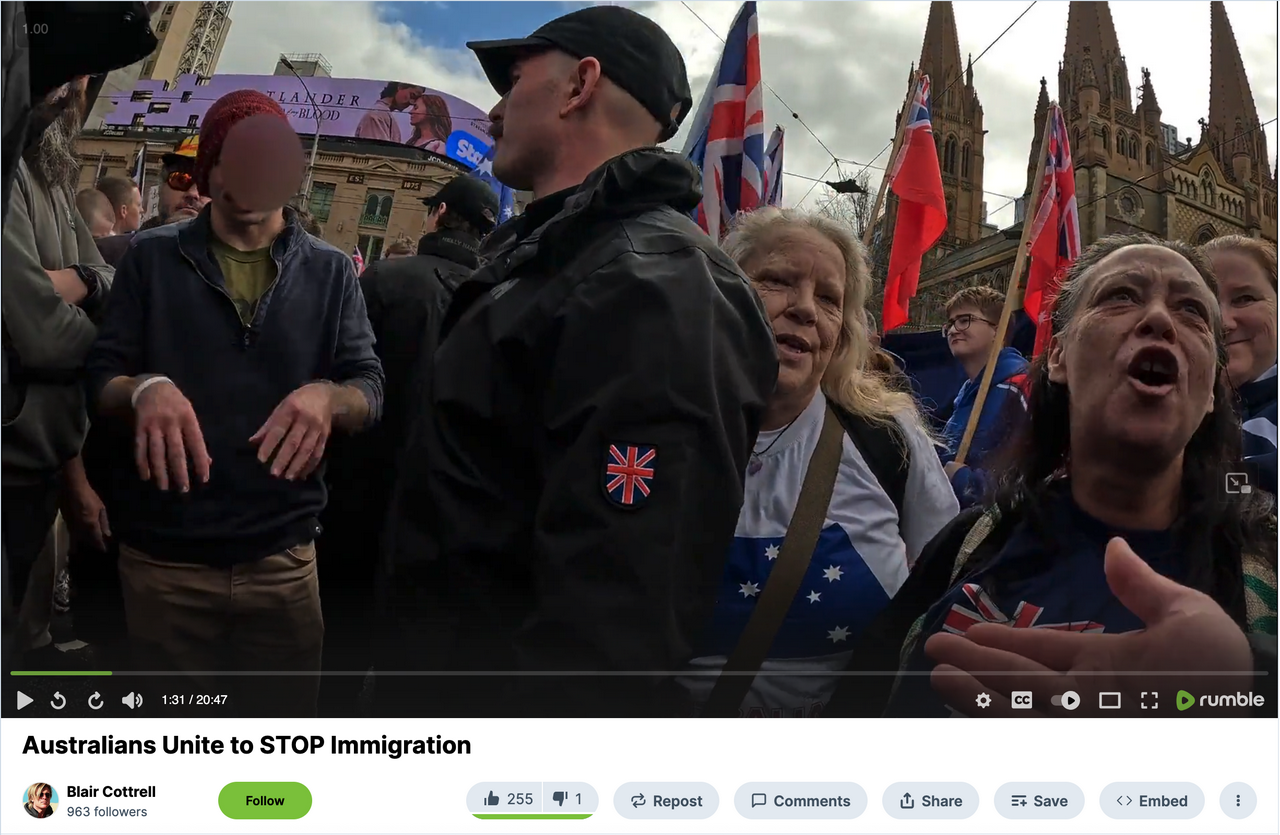Hour nine, late July, an Amish food stand on an empty lot: these are the circumstances that led to our discovery.
We had been driving since dawn. You sighed as we pulled over, reminding me I’d spent an hour chatting with a Minnesota farmer about this year’s corn crop, a subject about which I know nothing, and that I made us stop at Big Dick’s Buckhorn Inn in Spooner, Wisconsin, to see where John F. Kennedy used the restroom in March 1960.
“This is your culture,” I protested. You gestured at your violin, placed with care in the backseat, and said, “That’s my culture.”
Modern Money Lab | The Anti-Austerity Conference | Opening Keynotes (Steven Hail & Stephanie Kelton)
— Organisation: Modern Money Lab, YouTube —Media Report 2025.09.12
— Organisation: Free Palestine Melbourne —Modern Money Lab | The Anti-Austerity Conference | The Political Economy of the UK
— Organisation: Modern Money Lab, YouTube —The Martyrdom of Charlie Kirk - Read by Eunice Wong
— —This article is read by Eunice Wong, a Juilliard-trained actor, featured on Audible's list of Best Women Narrators. Her work is on the annual Best Audiobooks lists of the New York Times, Audible, AudioFile, & Library Journal. www.eunicewong.actor
Text originally published September 11, 2025.
Current ScholarshipWho is a central bank for? The founding and legal design of the Bank of Canada
— Organisation: Just Money —Seeds over a wall
— —
A lot of people are saying that the murder of Kirk was a false flag. They are also saying that the Reichstag fire was a false flag.
That way of talking about Kirk’s murder helps pro-Trump fascism.
What matters is not whether Kirk’s murder or the Reichstag fire were false flags.
The Ontario NDP Must Invest in Public Nuclear Power
— Publication: Perspectives Journal —This article complements ‘Ontario’s Costly Nuclear Folly,’ by David Robertson, originally published in Canadian Dimension on June 2, 2025.
The Ontario New Democratic Youth’s (ONDY) 2024 policy book envisions a future for Ontario that sounds like a Green New Deal dream. It paints a utopian picture of publicly-owned renewables, eco-brutalist social housing with rooftop solar panels, and socialized grocery stores. This democratic socialist vision for Ontario also includes the expansion of nuclear energy stations, operated by thousands of union members, generating enormous output without major greenhouse gas emissions. The ONDY policy book states:
Ontario’s Costly Nuclear Folly
— Publication: Perspectives Journal —This article was originally published in Canadian Dimension on June 2, 2025 and complements ‘The Ontario NDP Must Invest in Public Nuclear Power,’ by James Adair published on September 12, 2025.
The last time the nuclear industry got its way in Ontario, the province’s erstwhile publicly-owned electrical utility, Ontario Hydro, spent over two decades building 20 nuclear reactors. It was a mashup of missed deadlines, cost overruns and a troubling pattern of declining nuclear performance.
Even more troubling, the last generation of nuclear reactors forced Ontario Hydro to the edge of bankruptcy. It saddled the province with a mountain of nuclear debt that we are still paying off.
The Ford government is now repeating those costly mistakes in what amounts to the largest expansion of the nuclear industry in Canada’s history—risking a blunder of historic proportions.
The Right Wants a Reichstag Fire
— —Response to the Public Procurement Consultation
— Organisation: The Equality Trust —Public Procurement: Growing British industry, Jobs and Skills BetterforUs Consultation Response supported by the Structural Inequalities Alliance and Equality Trust Summary This document has been produced by BetterforUs, a national campaign run by Aspire Community Works, a Real Living Wage community business with seventeen years’ experience of delivering public contracts in London and the South […]
The post Response to the Public Procurement Consultation appeared first on Equality Trust.
North West Shelf final approval a climate, economic and energy security disaster
— Organisation: The Australia Institute —It marks the greatest giveaway of Australian resources ever and will undermine the nation’s energy security, while driving up energy prices.
Environment Minister Murray Watt has not provided details of the conditions on Woodside to protect the ancient, priceless Murujuga rock art or how much Woodside succeeded in watering down those conditions during 12 weeks of secret negotiations. However, it is clear that acid gas emissions from the project will continue corroding Murujuga until 2070.
Massive emissions
The approval will add around 90 million tonnes of emissions to the atmosphere annually, equivalent to building 12 new coal power stations.
Undermine energy security
The extension allows Woodside to export enough gas to supply Western Australia for around 90 years, despite WA facing looming gas shortages and price increases. Analysis here.
Arminianism, Antinomianism, and American Politics
— —
My first introduction to American religious debates was a course taught by a prof who came from Yale’s American Studies program (I ended up taking several courses from him), and, as is oddly appropriate for someone from Yale, he was deep into the theological disputes of the 17th century—Yale was founded because of those disputes.
The tragedy of the ‘measure to manage’ green financial policy paradigm
— Organisation: UCL Institute for Innovation and Public Purpose (IIPP) —
It has been almost a decade since Mark Carney put climate change on the agenda of central banks and financial authorities with his ‘Breaking the tragedy of the Horizon’ speech made at Lloyds of London Insurers. Carney noted that the catastrophic impacts of climate change would be felt too far into the future for financial institutions or policy makers to shift their decision-making today, but that “once climate change becomes a defining issue for financial stability, it may already be too late”.
Carney’s solution was to leverage the power of the market by helping financial firms better understand the risks they faced from climate change:
“Any efficient market reaction to climate change risks, as well as the technologies and policies to address them, must be founded on transparency of information. A ‘market’ in the transition to a 2-degree world can be built. It has the potential to pull forward adjustment — but only if information is available…”(Carney 2015, 12)
Honor the Memory of Charlie Kirk
— Organisation: The Claremont Institute —Charlie Kirk was a loving and dedicated husband and father; a pious, learned, and evangelizing Christian; and a hero, inspiration, and mentor to millions of young Americans trying to make sense of our turbulent political times. Many knew him much better (and for much longer) than I, but in recent years he had become my friend. He was always on the move, and yet I found he still managed, over and over again, to be generous with time he didn’t seem to have. He was a patriot—a vital and irreplaceable part of the Right in America. Because he was tireless, passionate, inspiring, and, above all, effective, he was a target. Now, he’s gone.
Charlie was a Lincoln fellow, supporter, and passionate defender of Claremont. When he attended our Lincoln fellowship in 2021, he was already one of the most famous men in American politics. His security detail was always close. And yet, busy and renowned as he was, he was a model Claremont fellowship participant. He was there to learn because he wanted to continue to hone his understanding and arguments on behalf of America and her founding principles.
Australia’s big choices | Between the Lines
— Organisation: The Australia Institute —The Wrap with Amy Remeikis
The world is at a crossroads and so far, Australia is reacting by sticking its head in the sand and pretending nothing is changing.
Leaders from across the globe are about to meet at the 80th UN General Assembly, in a nation which has cancelled the visas of Palestinian Authority delegates, is disappearing people off its streets, carrying out extrajudicial death sentences in its waters, and openly threatening war.
These are not normal times. Pretending they are, is part of what got us here in the first place.
The meeting will kick off on Tuesday, when the incoming president, Annalena Baerbock, a former German foreign affairs minister, will outline her agenda which runs until September 8 next year. She is taking the reins at a time where the UN director at the International Crisis Group, Richard Gowan, says “illusions have been rather stripped away” about the world, and how people feel about its leaders. “It’s now very, very clear that both financially and politically, the UN faces huge crises,” he said.
“Now the question is, is there a way through that?”
And indeed, what role does Australia play in that?
Australia is part of the nations who have agreed to give conditional recognition to Palestine, but it remains unclear at this point what that will look like at the meeting.
Anti-fragility and the Financial System
— Organisation: Reserve Bank of Australia (RBA) —From Stagnation to Inclusive Growth: How Income Inequality and Distributional Imbalances Stall Economic Growth in Canada
— Publication: Perspectives Journal —Since the late 2000s, Canada’s economic slowdown has been debated in terms of technological fatigue, demographic trends, monetary constraints, and global trade headwinds. This paper contends that the underlying source of stagnation fundamentally points to distributional imbalances and structural demand deficiency. Today’s stagnation is not cyclical, but a symptom of a structural trap—a regime of distributional stagnation rooted in the failure of the neoliberal paradigm to reconcile economic growth with social equity.
This analysis situates Canada’s stagnation within broader debates on “secular stagnation” and macroeconomic paradigm choice, drawing on leading theories that emphasize the role of demand, inequality, and institutional decline. There are three structural channels through which income inequality drives stagnation: (1) reduced household consumption due to top-heavy income distribution; (2) erosion of labour power weakening wage growth and demand; (3) a disconnect between rising profits and falling productive investment.
The American Mind Podcast: The Roundtable Episode 284
— Organisation: The Claremont Institute —The American Mind’s ‘Editorial Roundtable’ podcast is a weekly conversation with Ryan Williams, Spencer Klavan, and Mike Sabo devoted to uncovering the ideas and principles that drive American political life. Stream here or download from your favorite podcast host.
Lies, Damned Lies, and Statistics | The Roundtable Ep. 284
The editors open with an analysis of the killing of Ukrainian refugee Iryna Zarutska by a repeat violent offender, and discuss what it reveals about crime, media spin, and a legacy media more fixated on “Republicans pouncing” than the literally pouncing criminal himself. Follow-up discussion ranges from Europe’s disappearing crime stats to the Bureau of Labor Statistics’s downward revision of nearly a million jobs during the Biden presidency, probing whether institutions still merit public trust and what a reality-based politics on immigration, safety, and the economy might look like. The editors also touch on an immigration sweep at a Georgia battery plant and the gap between GDP and lived experience before closing with fresh culture picks.
Carney and the Calgary School: or, Passive Revolution and Canada’s Social State in the Neoliberal Era
— Publication: Perspectives Journal —Introduction: Passive Revolution in 2025
In the spring of 2025, when Canada narrowly avoided being swept up in a global wave of electoral successes for the (far) right, it was a puzzling moment. After years in which it appeared to be all but inevitable that Pierre Poilievre’s federal Conservative Party of Canada would form the first government of the post-Justin Trudeau era, the election of another minority Liberal Party government, led by Prime Minister Mark Carney, could seem an occasion for relief. An apparently ascendant right-wing in Canada was not so ascendant after all. However, notwithstanding the contingency of the minority Parliament and the initiation of US trade war upon the inauguration of the second Trump administration, it may be wrong to think that Canada has rejected or been spared the rise of the right. For the time being, at least, Canada’s Liberals have succeeded in a classic passive-revolutionary exercise: metabolizing and re-presenting elements of a threatening movement to ensure political survival and, as much as possible, re-establish electoral and policy dominance.
Yes, Minister. The secret haggling behind the destruction of an ancient treasure.
— Organisation: The Australia Institute —Woodside Energy is apparently baulking at strict new limits on nitrous oxide emissions the Albanese government wants to impose on its massive gas project to protect the ancient Indigenous rock art at Murujuga in WA.
The emissions limits are the “major sticking point” in the way of final approval for Woodside’s North West Shelf gas development, according to the AFR Rock art protections behind Woodside North West Shelf gas project delay.
Which begs the question: why is this a negotiation?
It tells you a lot about who wields power in Australia that Woodside is being allowed to haggle in secret over the conditions.
In May, Environment Minister Murray Watt gave provisional approval to a 45-year extension of the oil and gas giant’s liquid natural gas export hub on the Burrup, and an associated gas power plant.
This was subject to “strict conditions” – but they were never made public.
Supposedly, the secrecy was imposed to provide “procedural fairness” to Woodside. The gas giant was given 10 days to respond. It missed the deadline.
Four months later, the conditions are still cloaked in secrecy – and Woodside is still chipping away at them behind closed doors. So much for transparency.
Woodside’s gas facilities are adjacent to what many experts consider the most significant Indigenous rock art site in the world: The Murujuga Cultural Landscape.
Ballots Without Barriers: Empowering Unhoused Voters during the 2025 Ontario Election
— Publication: Perspectives Journal —In a democracy, the right to vote is a cornerstone of civic participation—yet for unhoused individuals across Canada, this right remains largely theoretical. Despite legislative guarantees under the Canada Elections Act, practical barriers continue to disenfranchise one of the country’s most marginalized populations. This article explores the persistent challenges that individuals experiencing homelessness face in accessing the ballot, using the Waterloo Region in Southwestern Ontario during the 2025 Ontario General Election as a case study to better understand these barriers across Canada. Through an analysis of systemic, logistical, and social obstacles, including restrictive identification requirements, inconsistent policy implementation, transportation challenges, and social stigma, this study aims to identify evidence-based strategies for advocacy and outreach that increase voter participation among unhoused individuals. The study combines a thematic analysis of interviews with representatives of organizations in direct engagement with unhoused people, alongside a comprehensive literature review, and offers recommendations to bridge the gap between electoral rights and electoral access for unhoused individuals in the Waterloo Region and across Canada.
This study was conducted as a community partnership with Waterloo Region Community Legal Services (WRCLS) and completed as part of the Policy Research in Action course in the Master of Applied Politics program at Wilfrid Laurier University.
Bell’s departure is overdue, but this crisis is not all her fault. Here’s why
— Organisation: The Australia Institute —Scandals have wracked Bell’s tenure, and a variety of surveys have shown widespread dissatisfaction with the ANU’s current leadership.
But the problems at the ANU are systemic.
They will not be solved with the departure of any one figure. Indeed, the governance crisis at Australia’s universities is sector-wide. In May, Dr Joshua Black and I wrote that the ANU’s rolling crises were predictable because they stem from its flawed governance structure.
Like all of Australia’s universities, the ANU lacks effective mechanisms for transparency, accountability, and representation. Every new scandal the sector has seen in the last four months is further proof.
The core problem is a vacuum of accountability. In the university sector, no one is held responsible for failure, at least no one at the top.
While vice-chancellors have CEO-like million-dollar pay packets, the university councils they answer to do not face nearly the same scrutiny as a public company’s board of directors.
The Democratic Politics of Industrial Policy and Defining Canadian Abundance
— Publication: Perspectives Journal —The economic headwinds facing Canada are greater than the sum of its parts. The pace and sporadic nature of the United States’ trade war with Canada is unprecedented and has recently dominated headlines, but the underlying structural challenges demand careful attention. The Covid-19 Pandemic-induced economic shock can be blamed for the acute inflationary jump in the cost of housing and food, but the interlinked productivity and cost-of-living crises have been brewing for more than a decade.1 The OECD predicts Canada’s per capita GDP growth will be last amongst OECD economies in the next 40 years.2 Nearly half of Canadians report difficulties meeting day-to-day expenses due to rising costs.3 Recall it was these economic crises that catapulted the Conservative Party under Pierre Poilievre into dominant polling territory before Trump’s victory changed the narrative.
The Martyrdom of Charlie Kirk
— —Back to the Future: Razing the Welfare State’s Third Pillar in the United States
— Publication: Perspectives Journal —Cross-national research on social policy and welfare states over the past five decades has proven invaluable in helping us to understand why some nations have been more successful than others in reducing social inequality and promoting the well-being of their populations. To date, this research has largely focused on the character and impact of two central pillars of social support: income transfers and social services.
The networks of transfer payments that constitute the welfare state’s first pillar, including unemployment insurance, accident insurance, pensions, child allowances and social assistance, provide income to people who have temporarily or permanently left the paid labour force, or otherwise require economic assistance. The welfare state’s second pillar is made up of various forms of social services, such as the care economy services of healthcare, childcare and elderly care, as well as decommodified provisions such as education, social housing and public transportation.
Charlie Kirk, Martyr
— Organisation: The Claremont Institute —This is who they chose to kill: the affable man whose main act was having good-faith political debates with college students. The man who, since fatherhood, was turning more toward Christianity as both a purpose and a theme. He was a partisan to be sure, but he was nowhere near the outer limits of the American tradition, especially given his relentless fixation on Lincolnian persuasion as a stabilizing force in a slowly disintegrating polity. The ones who kept losing debates with him didn’t feel that way, of course, but they were only the instrument, not the object, of his work. The object was the millions of Americans who watched, learned, and saw who won again and again—and decided that they wished to side with the winner.
In this way, Charlie Kirk was perhaps the closest thing to Socrates in the American public square. The leftist intellectuals who sneered at him—the rube peddling his simple lines, his crass sophistry, his heartland aw-shucks certainties—would guffaw at the parallel, but it is no less true. He argued—amiably, fairly, relentlessly—until they couldn’t stand it any longer. And like Socrates, they had him killed.
Also like Socrates, his students will now do more for his cause after his martyrdom than they ever did during his life. The Socratic vindication was in his deification through literature at the pens of Plato and Xenophon. Millennia later, everyone remembers the philosopher, but vanishingly few know who ended his life.
Editorial – Summer 2025
— Publication: Perspectives Journal —- Carney and the Calgary School: or, Passive Revolution and Canada’s Social State in the Neoliberal Era – Mack Penner
- Back to the Future: Razing the Welfare State’s Third Pillar in the United States – Gregg Olsen
- From Stagnation to Inclusive Growth: How Income Inequality and Distributional Imbalances Stall Economic Growth in Canada – Simone Mao
- The Democratic Politics of Industrial Policy and Defining Canadian Abundance – Michael Leger
- The Temptations of Trite: How Policymakers Avoid Addressing Homelessness as a Structural Challenge – Abe Oudshoorn et al.
- Ballots Without Barriers: Empowering Unhoused Voters during the 2025 Ontario Election – Lily Brousseau, Aya Kadhem, Romanpreet Kaur & Mary Kyle Legado
- Genuine Democracy in an Age of Hyper-Individualism – Grace Blakeley
Koala sanctuary may come with diabolical trade off
— Organisation: The Australia Institute —The proposed park ends native forest logging on the land and creates a vast sanctuary for koalas and 66 other threatened species.
But it’s always best to read the fine print and understand the Ts&Cs. In this case, they reveal a diabolical trade off.
The native forest will only be saved from logging if the government can monetise it as “carbon credits”.
“The final creation of the park is dependent on the successful registration of a carbon project,” the government makes abundantly clear.
It wants the Clean Energy Regulator to let it generate carbon credits, it seems, from a national park – an unprecedented step. If it can’t, the government says the vast koala sanctuary on the state’s mid north coast won’t go ahead.
Why is this demand a worry?
The NSW plan would only protect forests if they were monetised in ways that support continued carbon emissions.
Carbon credits are a license to pollute. If the NSW government is allowed to generate carbon credits from native forests earmarked for the great koala park, the most likely buyers would be big greenhouse gas emitters.
Under Australian law, these businesses can keep extracting and burning fossil fuels provided they “offset” their emissions by buying Australian Carbon Credit Units or ACCUs.
That’s how Woodside justifies its plans to open up new gas fields and process export gas on the North West Shelf until at least 2070 – with federal government approval.
Robodebt and super tax: Rob the poor, feed the rich?
— Organisation: The Australia Institute —On this episode of Dollars & Sense, Matt tells Elinor about the massive class action lawsuit settlement the Government made with the victims of Robodebt, Labor potentially getting cold feet on superannuation tax concession reform, and what they both tell us about how Australia views our poorest and wealthiest people.
This discussion was recorded on Thursday 11 September 2025 and things may have changed since recording.
Dead Centre: How political pragmatism is killing us by Richard Denniss is available now via the Australia Institute website.
Host: Matt Grudnoff, Senior Economist, the Australia Institute // @mattgrudnoff
Host: Elinor Johnston-Leek, Senior Content Producer, the Australia Institute // @elinorjohnstonleek
Show notes:
The Australia Institute Revenue Summit 2025
‘The changes to superannuation tax concessions are needed and very fair’ by Greg Jericho, the Australia Institute (May 2025)
The Temptations of Trite: How Policymakers Avoid Addressing Homelessness as a Structural Challenge
— Publication: Perspectives Journal —This article was co-written with contributions from Michelle Bilek, Jim Dunn, Jon Paul Mathias, Kateryna Metersky, Alex Nelson, Sophie O’Manique, Steven Rolfe, Colleen Van Loon, and Jeremy Wildeman.
Globally, researchers, service providers, advocates and lived experts who are trying to enact the prevention and ending of homelessness face various forms of government inertia. While United Nations member states have collectively signed onto the ‘right to adequate shelter’, 1 actualizing this human right occurs in significantly varying degrees between them. While human rights are ubiquitous, there remains an underlying perception of ‘deserving poor’, even among adherents and advocates to those rights, whereby assistance is provided only to some and under limited criteria. The status quo, in the form of government inaction on the actualization of these human rights, resists the universalization of these rights by creating counter-narratives against those proposing policy action.
ACT should not copy unfair and undemocratic electoral changes – submission
— Organisation: The Australia Institute —It describes changes in other jurisdictions as “rushed, self-interested and poorly justified”.
The Australia Institute submission also warns that rules on early voting, roadside election signage and a 100-metre exclusion zone for handing out how-to-vote cards could undermine election day as a “festival of democracy” in the very heart of the nation’s democracy.
Research shows that a “reimbursement” model for public funding, as recommended by the ACT Electoral Commission, would favour wealthy incumbents at the expense of new entrants.
Trump vs. the Curators
— Organisation: The Claremont Institute —In 2021, a poll showed that only one-third (36%) of Americans between the ages of 18 and 24 were “very” proud to be Americans. Another third stated they were only slightly or not at all proud of their country. Ten years earlier, Pew Research anticipated the trend when it noted that the rate of Millennials who called themselves “very patriotic” fell from 80% in 2003 to 70% in 2011.
Part of a national museum’s job is to prevent that outcome. Preserving the historical truth is a high purpose, but so is instilling the sentiment of gratitude. America’s museums can and should do both.
Instead, as of this writing, if you visit the home page of the Smithsonian’s Museum of American History, the very first exhibit you see is the Greensboro lunch counter from the famous sit-in of 65 years ago. The text introducing the exhibit gives visitors to the site the first fact they are to learn about the American past: “Racial segregation was still legal in the United States on February 1, 1960.”
Ian Lomax, neo-Nazi dentist
— Organisation: White Rose Society —
On 6 September 2025 we revealed in The Age that Victorian dentist Ian Lomax is a member of the National Socialist Network.
Lomax previously practiced dentistry in New South Wales. We first saw him training at Elwood with the National Socialist Network in February this year, in footage taken by The Age:
White supremacist bootcamp takes over Elwood beach

Lomax has also featured on a National Socialist Network Telegram channel, in a training photograph for the Victorian Rural West chapter, alongside Hamish Cameron and Gus Hartigan:

Lomax attended the March for Australia rally in Melbourne on 31 August. Blair Cottrell badly blurred him in a video he published, attempting, “This man is a dentist so we can't show you his face on video. Morning Ian.”

Statement on behalf of the family of Nathan Bull
— Organisation: White Rose Society —We, as Nathan Bull’s family, are utterly devastated and remain in disbelief at his decision to join this group. From the very beginning, we made it clear that if he chose this path, we could no longer be an active part of his life. Sadly, that is the decision he made.
We are deeply concerned about the continued spread of misinformation and incorrect assumptions about our family. For clarity:
Nathan’s father has not been a member of Victoria Police for more than three years.
He is not “Luke Bull,” the officer charged and found guilty in relation to a separate matter last year.
He is in no way racist, nor did he have a negative influence on Nathan growing up.
We would also like to address a photo of Nathan shared publicly from his 21st birthday, where his father expressed pride in him. At that time, we had no knowledge of any association Nathan may have had with this group, nor any understanding of the meaning behind the T-shirt he wore. At that point, Nathan was working, engaged with his family, and we believed he was becoming a fine young man. Not long after, our trust in that belief was sadly shattered.
We respectfully ask the community and media to stop contacting us. I personally have received abusive phone calls today, including many from private numbers that I have not answered. This is deeply distressing.
We are embarrassed to see Nathan continually featured in the media and saddened by the possibility that he may never leave this group. His choices are his alone.
9 Principles for Journalists Reporting On Neo-Nazis
— Organisation: White Rose Society —You may have landed here because you want to talk about neo-Nazis without helping them. Excellent.
You have an important role in combatting the rise of these groups. You must remember at all times – however they present themselves – the underlying ideology of all neo-Nazis is murderous.
Remember: They are a cult that want journalists to help launder their image and legitimise their movement and beliefs.
Above all – don't be fooled
Neo-Nazis look “normal”. They have families, friends, work colleagues. They shop at the same places you do. They go to the gym. They go to university. They work on building sites and in offices. They have respectable careers. This isn't “Romper Stomper” – most do not have shaved heads, swastika tattoos and broken teeth.
Don't be fooled.
Remember: All neo-Nazis share the same murderous beliefs. They want an extremely conservative white-only Australia. Anyone else “must go,” a euphemism that oscillates between deportation and mass murder. Never lose sight of that.
1. Do not assist their media strategy.
Neo-Nazis have a simple strategy when it comes to media:
If they can't get an opportunity to appear in the media, they create one.
Do you know these neo-Nazis? Here's how you can help.
— Organisation: White Rose Society —
On the 26th of January 2025, 17 people were arrested in Adelaide over a public stunt organised by members of the National Socialist Network (NSN).
We've provided a list of the 16 adult arrestees as an open call-out for any further detail you might be able to provide:
- Do you know one of them through work?
- The local shops?
- Are they mates with your mates?
- Did you go to school together?
- Anything else of interest no matter how big or small.
Help us by sharing any verifiable information by securely dropping us a line at thewhiterosesociety@protonmail.com. You'll remain anonymous.
The information we're providing here is not exhaustive and is only given as an identification aid. We've omitted some information we already possess, but don't let that deter you from sending us a tip. Suburbs listed below are retrieved from either court or police reports, and may not exactly reflect the person's home suburb.
Taking the Louise Black-pill
— Organisation: White Rose Society —tl;dr: Racist bigot who pals around with neo-Nazis is a well-connected Victorian Liberal Party member who stood for local council elections as an independent.
Ex Victorian Liberal Party parliamentarian Moira Deeming has told the court over the past few weeks that she has no association with the far-Right whatsoever – we're not quite sure that's true. Join us as we pull the thread on one Deeming ally with dubious connections.
Active Clubs & Accelerationists - Neo-Nazi tactics and strategies in Australia
— Organisation: White Rose Society —Excerpt from our submission to the Senate inquiry Right wing extremist movements in Australia.
On July 24, 2024, at the Senate Committee investigating right wing extremist movements in Australia, practitioners from the Counter Extremism Project presented an embarrassingly incorrect account of the state of the Australian extreme right landscape, particularly concerning Active Clubs.
This highlights a key problem with the Countering Violent Extremism industrial complex—individuals who have spent the past twenty years focusing on the Islamophobic war on terror often lack substantial knowledge about the extreme right. Despite this, they are positioned as experts while chasing grant money into the right-wing space.
National Socialist Network fail to attack anti-fascist fundraiser in Thornbury
— Organisation: White Rose Society —On September 15, 2023, neo-Nazis from National Socialist Network, armed with knives, attempted to attack an anti-fascist gig in Thornbury at Café Gummo. The gig was a fundraiser for us and the Black Peoples Union.

If you recognise any of these cowards e-mail us thewhiterosesociety@protonmail.com. Please share this image in your networks and on your social media in case anyone recognises them. We have numbered the faces of those we do not yet know the names of.
If you would like to amplify our X post/tweet of these faces you can repost it at this link.
Video of National Socialist Network running like rats:
A group of neo nazis has squared off with anti-fascists, in a terrifying brawl that took over Thornbury's main street. @ajhegarty9 #9News pic.twitter.com/B4OmCJmI9f
Far-right targeting of councils and LGBTQI+ events
— Organisation: White Rose Society —My motion at council tonight to reaffirm our commitment to the LGBTIQA+ community after rainbow storytime events were cancelled due to threats from the far right, has passed!
— Cr Tim Baxter 🏳️🌈 (@BaxterTim) June 21, 2023
Red text are the small changes made by request from other councillors. pic.twitter.com/0YHY21bfB4
On 21 June 2023, Councillor Tim Baxter from the City of Port Phillip successfully tabled a motion to reaffirm the council's commitment to the LGBTIQA+ community after rainbow story hour events were cancelled due to threats from the far-right. This has come in the wake of a wave of cancellations from councils and other event organisers this year, particularly related to IDAHOBIT Day and during Pride Month. This motion allows the City of Port Phillip to begin work on how to hold safer events in the future, an urgent issue for many other councils that requires leadership. We are pleased that the City of Port Phillip is showing leadership on this issue and hope it will lead to safer events for the Rainbow Community and families.
Gabe Seymour, Queensland Nazi leader
— Organisation: White Rose Society —Content warning for extreme misogyny, racism, Antisemitism, Islamophobia and violence, discussions of neo-Nazi terrorist attacks, and mention (but no description) of rape.
Gabriel Llewellyn Russell Seymour from Thornlands is the leader of the Queensland branch of Australia's largest neo-Nazi network, the National Socialist Network (NSN). Posting simply as ‘Gabe’ in Nazi online chats or as ‘Gabe Smith’ on wider social media, Seymour's identity was unknown until our research was used to profile him in the recent expose by The Age of Australian neo-Nazi leaders:
Seymour’s identity was confirmed by anti-fascist researchers from the White Rose Society using online surveillance. They matched photos he posted of neo-Nazi propaganda at his Queensland home to pictures of a house listed for sale on a real estate website. Public records linked Seymour to this home address.

Legacy of Hate
— Organisation: White Rose Society —On December 3rd 2022, the National Socialist Network (NSN)/European Australian Movement (EAM) held a Mixed Martial Arts event at an undisclosed location. In advertising for the event, they said that it would take place in the Western Suburbs of Melbourne.
The Age newspaper today disclosed the location of this event. We provide the following information for the benefit of parents whose children attend this gym.
On December 11, the EAM Telegram channel posted a photo from the event. It depicted 47 people in an industrial gym setting with EAM and swastika flags hanging from the walls. Most of the people in the photo had their faces blurred in addition to wearing face coverings. For some reason, it seemed a few remained unsure about the quality of the NSN's opsec.

The gym in the photograph was very quickly identified by a number of anti-fascist researchers as belonging to Legacy Boxing Gym, and located in Sunshine West.
(En)Gendering Authoritarianism
— Organisation: Over Zero —Over Zero and the Othering and Belonging Institute just launched their new report: (En)Gendering Authoritarianism: A Six-Strategy Framework Examining How Political and Cultural Leaders Weaponize Gender in Ways that Advance Authoritarianism.
This report explores how political and cultural leaders weaponize narratives and policies on gender identity, women’s rights, and sexuality to advance authoritarianism. It demonstrates that attacks on women’s rights, feminism, and LGBTQ communities are neither random nor organic—but part of a larger strategy to manufacture social division, distract from policy failures and corruption, and create a permission structure for power consolidation and violence.
The report introduces a six-strategy framework that shows how authoritarian movements exploit gendered anxieties to divide societies, launder and normalize social hierarchies, and reshape cultural norms—all while eroding democratic freedoms.
Visit our dedicated microsite, where you can access:
No right to know?
— Organisation: The Australia Institute —On this episode of Follow the Money, transparency advocate Rex Patrick and Australia Institute Democracy & Accountability Director Bill Browne to discuss the failing freedom of information system and why the proposed changes could make government less transparent – not more.
Dead Centre: How political pragmatism is killing us by Richard Denniss is available now via the Australia Institute website.
Guest: Rex Patrick, former Senator for South Australia // @mrrexpatrick
Guest: Bill Browne, Democracy & Accountability Director, the Australia Institute // @browne90
Host: Ebony Bennett, Deputy Director, the Australia Institute // @ebonybennett
Show notes:
Proposed changes to Freedom of Information scheme don’t add up, the Australia Institute (September 2025)


